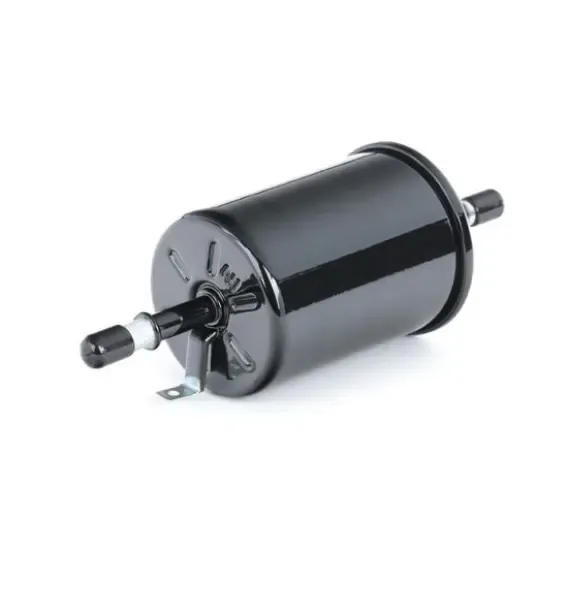May . 09, 2025 16:52 Back to list
Understanding Fuel Filter Types
When it comes to maintaining engine health, knowing the different fuel filter types can make a significant difference. A Fuel Filter acts as a protective barrier, removing impurities like dust, rust, and water from the fuel before it reaches your engine.

There are several major fuel filter types, including inline filters, cartridge filters, spin-on filters, and water-separating filters. Inline filters are most common in modern vehicles, while spin-on filters are widely used in heavy-duty applications. Cartridge filters are cost-effective and easy to maintain, whereas water-separating filters are essential for diesel engines that are prone to water contamination.
The right choice of fuel filter types depends on your vehicle model, fuel type, and environmental conditions. For off-road vehicles or engines exposed to rough fuel quality, a high-capacity or dual-stage filter is recommended.
Regular inspection and understanding of fuel filter types ensures optimal fuel flow, better combustion, and longer engine life.
What Is a Fuel Filter and Why Your Vehicle Needs One
A Fuel Filter may be small, but it plays a powerful role in your engine’s overall performance. Positioned between the fuel tank and engine, it filters out contaminants that can clog injectors, reduce fuel efficiency, or even damage your engine.
Modern Fuel Filter designs feature multi-layer filtration media to handle fine particulates and ensure consistent fuel delivery. For vehicles with direct fuel injection systems, high-efficiency filters are essential to maintain the precise flow required for performance.
Neglecting your Fuel Filter can lead to costly repairs. Dirty or clogged filters cause engine hesitation, poor acceleration, misfires, and in severe cases, total fuel delivery failure.
Choosing a high-quality Fuel Filter ensures smoother engine operation, reduced emissions, and prolonged injector life. Whether you drive a passenger car, truck, or agricultural machine, this tiny component is key to your engine’s health.
Fuel Filter Cost Explained: What You’re Really Paying For
Understanding fuel filter cost is essential when budgeting for routine vehicle maintenance. On average, a standard Fuel Filter ranges from $10 to $40 for most vehicles. High-performance or specialty filters, such as those for diesel engines, can cost $50 or more.
What influences fuel filter cost? Factors include filter material, micron rating, brand, vehicle compatibility, and added features like water separation. Premium filters might use advanced synthetic media or include integrated sensors to detect contamination levels.
Beyond the product itself, labor also affects fuel filter cost. Installation can be straightforward for inline filters but more complex for systems buried within fuel tanks or involving pressurized lines.
To save on fuel filter cost, many vehicle owners buy filters in multi-packs or perform replacements themselves. However, always prioritize quality over price—cheap filters may allow particles to bypass and damage your engine.
When and How to Handle Fuel Filter Replacement Properly
Timely fuel filter replacement can mean the difference between a smoothly running engine and unexpected breakdowns. Most manufacturers recommend fuel filter replacement every 20,000 to 40,000 kilometers, though diesel engines may require more frequent changes due to higher contamination risks.
Symptoms that indicate you need fuel filter replacement include: reduced engine power, frequent stalling, slow starts, or a check engine light. Delaying replacement can cause these issues to escalate.
The fuel filter replacement process varies. For some vehicles, it's a quick, DIY-friendly task; for others, especially those with in-tank filters, it requires professional tools and technical knowledge.
Always consult your vehicle’s manual before fuel filter replacement, and choose filters from reputable brands that meet OEM specifications. Routine replacement improves fuel economy, boosts power, and protects your fuel system components long-term.
Where to Buy Reliable Fuel Filters and Parts at the Best Prices
Finding trusted suppliers for your next Fuel Filter purchase is crucial to vehicle performance and safety. Online platforms like Amazon, eBay, and automotive-specific stores offer a wide selection of brands and fuel filter types suitable for different models.
For bulk orders or commercial fleets, connecting with certified fuel system part distributors or OEM manufacturers can reduce fuel filter cost and ensure a consistent supply chain. Many also offer custom branding, packaging, and private labeling options.
Whether you’re handling a routine fuel filter replacement or upgrading to a more advanced filter type, always check product compatibility, warranty, and filtration ratings before purchasing.
If you’re unsure about the correct fuel filter types for your engine, reputable sellers often provide size guides and customer service consultations. Don’t compromise quality to save a few dollars—your engine depends on it.
Fuel Filter FAQs
What are the main fuel filter types used in vehicles today?
Inline, spin-on, cartridge, and water-separating filters are the most common. Your choice depends on vehicle type, fuel system, and engine needs.
How often should I perform a fuel filter replacement?
Most vehicles need a replacement every 20,000 to 40,000 km, but consult your owner's manual for model-specific recommendations.
Why does fuel filter cost vary so much between brands?
Higher-end filters use better materials, offer finer filtration, and may include features like water separation or electronic sensors.
Can I perform a fuel filter replacement myself?
Yes, if your vehicle’s filter is accessible and you have basic tools. However, some models require professional service due to complex setups.
Where can I buy quality fuel filters for less?
Try trusted online stores, auto part suppliers, or direct manufacturers. Buying in bulk or during promotions can lower your fuel filter cost.
-
Why Change Your Car Air Filter?
NewsJun.23,2025
-
Why Change the Air Filter in Your Car?
NewsJun.23,2025
-
Toyota Oil Change Tips You Should Follow
NewsJun.23,2025
-
The Right Oil Filter for Your Car
NewsJun.23,2025
-
How to Choose the Right Air Filter for Your Car
NewsJun.23,2025
-
How to Change the Air Filter in Your Toyota Corolla
NewsJun.23,2025


